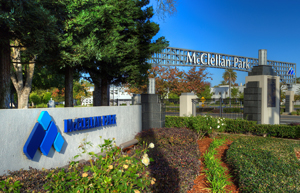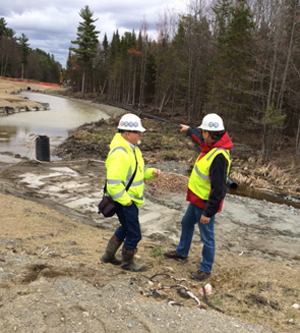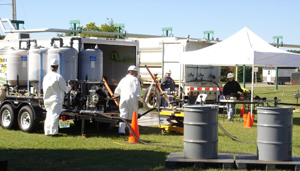Complex laws, time-consuming requirements, multiple government regulators: It can all add up to costly delays in the remediation process. The experience and know-how of TechLaw’s environmental experts are key assets that save time, money—and aggravation—during the remediation process. With more than 30 years of providing environmental remediation oversight under the US Environmental Protection Agency’s Superfund and RCRA programs, we understand the technical and administrative requirements of the site remediation process.
We have provided oversight and guidance to our government and commercial clients in all aspects of the Superfund and RCRA CA process:
- Site Discovery
- Site Assessment
- Remedial Investigation/Feasibility Studies
- Regulatory decision documents, such as Proposed Plans and Records of Decisions
- Remedial Designs
- Construction Completion
- Remedial Action Completion
- NPL delisting
The remediation activities that we oversee are mostly driven by Unilateral and Consent Orders, Permits, Federal Facility Agreements and State regulatory programs for site cleanup.
Since we specialize in oversight of the site remediation process, we are currently guiding Federal and State clients through complex remediation projects at dozens of sites, and have been involved in several hundred site cleanups across the US, including CERCLA and RCRA sites in all 50 states and US territories, such as Puerto Rico, the Virgin Islands and Guam.
McClellan AFB
Sacramento, CA
 TechLaw provided remediation oversight in support of US EPA during the transition of this formerly polluted active base from closure to reuse, ensuring that environmental reporting and transfer documentation met federal and state regulatory requirements. Our experts prepared for and participated in a variety of meetings, including: Base Closure Team meetings, Proposed Plans, Technical Working Group meetings, Groundwater Issues, Comment Resolution, field updates, post-excavation radiological results, and remedial action closure reports. We worked with federal, state and local environmental agencies, including technical and legal representatives, to determine if sites could be transferred for unrestricted use, or if they required institutional and/or engineering controls.
TechLaw provided remediation oversight in support of US EPA during the transition of this formerly polluted active base from closure to reuse, ensuring that environmental reporting and transfer documentation met federal and state regulatory requirements. Our experts prepared for and participated in a variety of meetings, including: Base Closure Team meetings, Proposed Plans, Technical Working Group meetings, Groundwater Issues, Comment Resolution, field updates, post-excavation radiological results, and remedial action closure reports. We worked with federal, state and local environmental agencies, including technical and legal representatives, to determine if sites could be transferred for unrestricted use, or if they required institutional and/or engineering controls.
On 43 sites within the base complex, TechLaw oversaw:
- soil and soil gas sampling
- excavation
- post excavation sampling
- site restoration
The former base is now a mixed-use business park.
Mallinckrodt Chemical Company
Orrington, ME
 TechLaw is currently providing independent oversight monitoring of ongoing remediation for the State of Maine at one of the largest contaminated sites in state history at a former chemical manufacturing facility on the Penobscot River, near the Gulf of Maine. The years-long discharge of toxic mercury into the Penobscot River from the plant led to fishing bans in that area of the river, while remediation continues. Under the terms of an Environmental Protection Order between the Maine Department of Environmental Protection (MDEP) and Mallinckrodt Chemical Co., TechLaw was retained to monitor and document cleanup activities at the site. TechLaw is overseeing:
TechLaw is currently providing independent oversight monitoring of ongoing remediation for the State of Maine at one of the largest contaminated sites in state history at a former chemical manufacturing facility on the Penobscot River, near the Gulf of Maine. The years-long discharge of toxic mercury into the Penobscot River from the plant led to fishing bans in that area of the river, while remediation continues. Under the terms of an Environmental Protection Order between the Maine Department of Environmental Protection (MDEP) and Mallinckrodt Chemical Co., TechLaw was retained to monitor and document cleanup activities at the site. TechLaw is overseeing:
- Construction operation and monitoring of the wastewater treatment plant
- Installation of additional wells for groundwater, soil and sediment sampling
- Support for groundwater modeling
- Monitoring activities, including groundwater, soil, sediment, surface water, air, and biological
- Site preparation/structure dismantling
- Construction of loading facilities for offsite contaminated media, including upgrades of rail lines
- Excavation, storage, loading and offsite transport of soil, sediment, and landfill sludges
- Stabilization of areas along the Penobscot River and grading of the site post-excavation
- Removal and testing of the underground industrial sewer, bedding and surrounding soils
- Installation of groundwater capture works
- Construction of a new hazardous waste cover system over existing landfills
- Erosion and control measures
US Department of Energy Savannah River Site (SRS)
Aiken, SC
 The SRS produced radioactive tritium, plutonium, and other special nuclear materials for US defense programs, as well for the space program and medical, industrial, and research purposes for decades. Chemical and radioactive wastes have been treated, stored, and disposed at the facility, leading to soil and groundwater contamination. TechLaw supported the US EPA remediation and Deactivation and Decommissioning (D&D) activities, which included oversight for: field work, work plans, Sampling and Analysis Plans (SAPs), and Quality Assurance Project Plans (QAPPs). We conducted reviews to ensure that decommissioning alternatives were protective of human health and the environment based on CERCLA criteria.
The SRS produced radioactive tritium, plutonium, and other special nuclear materials for US defense programs, as well for the space program and medical, industrial, and research purposes for decades. Chemical and radioactive wastes have been treated, stored, and disposed at the facility, leading to soil and groundwater contamination. TechLaw supported the US EPA remediation and Deactivation and Decommissioning (D&D) activities, which included oversight for: field work, work plans, Sampling and Analysis Plans (SAPs), and Quality Assurance Project Plans (QAPPs). We conducted reviews to ensure that decommissioning alternatives were protective of human health and the environment based on CERCLA criteria.
Our expertise in sampling and analysis and Quality Assurance was instrumental in the coordinated efforts between the DOE, EPA, and the South Carolina Department of Health and Environmental Control (SCDHEC) to reach a significant milestone in successfully closing two high-level waste tanks.
In addition, TechLaw coordinated outreach and education efforts for the Superfund Job Training Initiative (SRS-SuperJTI), the first at a federal facility in the nation to help provide needed jobs for area residents. Our team also helped provide Environmental Justice support, coordinating informational and educational programs to surrounding communities.
